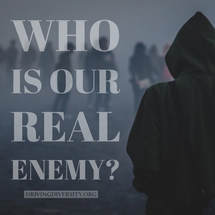 Recently, I have been reading a book called “Satan and His Kingdom” by Dennis McCallum. In one of the chapters, something hit me while I was reading. He talked about how Satan keeps us from taking territory for the Kingdom through distractions. He then gave an example about how Christians spent years--lots of money and energy--on prohibition (politicking to get alcohol considered illegal). This really did not do anything but produce anger toward Christians. “What does that have to do with diversity?” Well, I’m glad you asked. For the past couple of months some NFL players have been protesting the American Flag because of police brutality toward African Americans. While there should be a Gospel centered response from the Church, the idol of patriotism has reared its ugly head once again. I truly believe the devil is using this to target God’s church in order to divide us and keep us from what matters most and what matters to Jesus: the souls of people. Is Jesus using this situation to show where our hearts are really at? Does Jesus care about our patriotism? Yes, I believe He does. If anything, I believe it shows where our heart truly lies: with Him and His Kingdom or with our country of origin and our nationality. I know that this may sting, but let me challenge something. As a black man, I had to have a come to Jesus moment and choose which was more important, being black or being part of God’s kingdom. I had to “die to myself” and release my identity to join God’s kingdom and become His son. I’m not saying I had to give up my heritage or give up being proud of where I came from. What I mean is this: being black comes second to being part of His Kingdom. The same thing should go for pride in our nationality. The love of country and pride in our people should only come second to being part of the Family of God. Sure, we can be proud to be American, but being American should not supersede being a child of God and being part of His Kingdom. Our love of culture and country are offensive to Jesus if He does not come first. As God’s people, we need to reorient our lives around His purposes and His vision for His Kingdom. Here is how we can do this in light of social justice issues:
As God’s body, we should be “loving our neighbor as ourselves”, be “quick to listen and slow to speak”, and demonstrate fruits of the Spirit like love, peace, patience, kindness, and self-control. These things should rule our interactions with people, especially on hot topics like the NFL kneeling at the flag controversy. How can we claim to be fully part of God’s Kingdom if we do not allow his loving law to take priority control over our hearts, minds and actions? 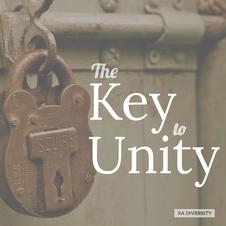 Now when Joshua was near Jericho, he looked up and saw a man standing in front of him with a drawn sword in his hand. Joshua went up to him and asked, “Are you for us or for our enemies?” “Neither,” he replied, “but as commander of the army of the Lord I have now come.” Then Joshua fell facedown to the ground in reverence, and asked him, “What message does my Lord have for his servant?” The commander of the Lord’s army replied, “Take off your sandals, for the place where you are standing is holy.” And Joshua did so. (Joshua 5:13-15) Again and again, I find myself coming back to Joshua’s encounter with “the commander of the Lord’s army.” I feel it has something super important to say to the church today. Joshua was Moses’ successor. Moses led Israel for forty years. He prepared the people to enter the Promised Land by teaching them God’s commandments, directing them in the construction of the tabernacle, and interceding for them through all their rebellions. He was the man for the preparation, but not for the advance. For entering the land, they needed a soldier. So it makes perfect sense for Joshua to lead the nation next. After all, the Promised Land would need to be fought for. The first great battle, if it can be called that, was Jericho. God directed Joshua and Israel there. They had spied it out. They had prepared themselves. They eagerly anticipated and expected their first victory. This is where it began. They were there at God’s command and on his business, and yet… And yet, when Joshua came near Jericho he saw a man in front of him with a drawn sword in his hand. He asks a logical question, “Are you for us or our enemies?” This figure must have been somewhat frightening. I would guess he would be the type of man Joshua would want fighting for him, not against him. So I think his question to be both logical and prudent. It’s the answer that I think speaks to us still. “Neither.” Even though Joshua was about to enter a battle that God himself had sent him to fight, the “commander of the army of the Lord” does not say, “I am here to fight with you. I am on your side.” No, he says, “neither”. The commander of the Lord’s army was not there to assure Joshua God was on his side, instead he was there to make sure Joshua and Israel were on God’s side. It is so easy for us to co-opt God’s endorsement for our side, our views, and our agenda. In just how many wars have opposing sides both claimed God was fighting for them? Are we not guilty of this still today? Does this mean God does not have an opinion on the battles of our day? I am pretty sure God has an opinion on pretty much everything. The question is, are we seeking it out? Are we humbly bowing down like Joshua did and asking, “What message does my Lord have for his servant?” Are we getting on his side and working from there? Are we entering the holy place, seeking his face, and with trembling hearts and minds saying, “Father, show me your ways that I may walk in them?” Or, are we instead, giving into the spirit of the age and justifying our venting under the banner, “I have a right to my own opinion and can say whatever I want.” There are lots of battles taking place in our nation today. The lines are drawn and people tend to pick one extreme side or another. Should those who claim to be Christ’s ambassadors enter the fray, shouting as loudly and meanly as everyone else? Should we not instead, stand out from the crowd? Jesus’ apostles included a tax collector and a zealot, representative from two extremely opposing sides of the issues of that day. They found unity, not on the issues, but by laying down their lives, picking up their own crosses, and following him. There cannot be unity in the church today, unless today’s disciples are willing to do the same. This is the starting place. Like Joshua there will be battles we will need to fight, but like him, first make sure we bow down, humble ourselves, and get on God’s side. 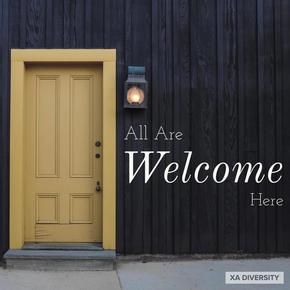 What does it mean to welcome someone? When we talk about creating a multi-ethnic Christian community we often talk about being a welcoming place, about welcoming everyone. But how does welcoming really work? Stores often have welcome signs on their doors. It means they are open, ready for business, and want you to come in. Is that what we mean as well when we tell someone they are welcome to come to our service or discipleship small group? Are we saying, “no one is going to keep you out”, “we really want you here” or is there even more to it than that? I sometimes have the privilege of traveling to campus groups and churches to share the vision of kingdom diversity. During these visits I am often hosted for meals or even put up in a kind person’s home for several days. In some ways, I am a professional guest. While I try to be a good guest, I am not a trouble free one. Because I suffer from food and environmental allergies, hosting me is not hassle free. Cleaning chemicals, perfumes, and scented candles can trigger a migraine. I can’t eat pizza, sandwiches, or pasta due to a wheat allergy. Do you know how common these foods are? Even some pets can cause me problems. In other words, you don’t want to invite me to your house! And yet, I am frequently overwhelmed with the amount of time and forethought my hosts take to prepare for my arrival. They air out their houses. They buy special foods. They exile their pets to other rooms. You know how this makes me feel? It makes me feel welcome! Funny, how being a troublesome guest can teach you so much about what real welcome is. It is so much more than opening the door or being happy someone is there. It is really all about preparation. I think about how our Father prepared the world for us, to make us feel at home in it. It is first act of hospitality. In the same way, if we want to create a kingdom community on our campus or in our church, one that represents our Lord and makes our Father happy, we need to prepare. For my hosts, preparation starts with information. We’ve actually put together a “Hosting Belkis Guide” for this purpose. For you, it may start with asking students from different ethnic groups you are reaching out to, “Hey, what can we do to make you feel at home?” Sure, I can probably answer that question for you; you might even be able to find the information on the internet (probably even here on this site). But just asking the question let’s people know you care. It does not even have to be a member of your congregation. You can ask anyone you have a relationship with. Something like, “we really want to be a church/group that represents God’s kingdom in every way. We are trying to be more diverse but don’t know how to make different ethnic groups feel at home and welcome at our service. Can you help me?” It is a humble question that expresses your vision and you desires. 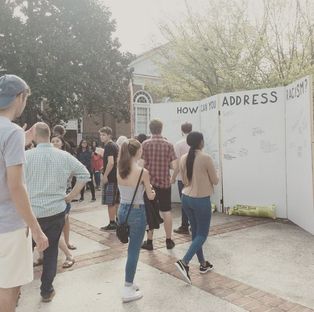 "Blood and soil," they chanted, invoking racist Nazi rhetoric of the past. With what appeared to be a fire of hatred in their eyes, these White Nationalists marched the Grounds of our University and our city seeking to instill fear. They came in hundreds. They came with guns. They came with torches. How can one respond to such blatant hate, especially when it hits so close to home? Jesus said his followers are the light of the world, a city on a hill that cannot be hidden (Matt. 5:14). As campus ministers at the University of Virginia, we had to think about what carrying this "light" would mean for us. How would we bear the torch of God’s fire for the world? So we came with prayer. In the aftermath of the violence on our campus and city, we decided to host a prayer walk along the same path the White Supremacists took at our university. We prayed for the reconciliation, healing, love, and truth of God to reclaim what the enemy sought to steal. At various locations, we stopped and prayed out loud specific prayers for God to intervene at UVA. Many of our students and members from other ministries joined us in a moment of Christian solidarity. We came with conversations. As the forces of darkness sought to build a wall of division between people, we built a conversation wall, literally. It stood all of 8 feet tall and 12 feet wide. Across the top, where everyone could read, we wrote: “How can you address racism?” In just three hours, the wall filled with hundreds of written responses from students of diverse backgrounds expressing their frustrations, solutions, and hopes. We engaged these students with gospel-centered conversations, offering Jesus as the solution to a world in division. It was the boldest question we’ve ever asked publically at our university, but sometimes we need our strategies to match up against what we’re fighting. We came with attentive ears. “Christians, especially ministers, so often think they must always contribute something when they are in the company of others, that this is the one service they have to render,” Bonhoeffer writes in Life Together. How many times have we been quick to speak, to assume, or to overlook because we fail to intentionally listen? During this time of heightened racial tension in our country, I’ve discovered how humbling and instructive it is to engage with the experiences of our ethnic minority students. We learn a great deal when we take the time to see our world through a different lens. Take Bonhoeffer’s advice: “listening can be a greater service than speaking.” The task is far from over, and let’s be humble enough to admit we don’t always get things right. It is out of our necessity that we turn to our God for courage, peace, and wisdom as we seek to carry his torch of reconciliation. No matter what campus you find yourself in, it is such a strategic time to be on university campuses. We all, as campus ministers, have so much exciting work to do! In Christ, we have the answer for what our country and the world is yearning for-- the ministry of reconciliation. Let us labor with love and unity to be His ambassadors on our campus. As you process what all this means for you and your specific university campus, I encourage you to pray. Pray for the connections your students are making on your campus Pray for those on your campus who are hurting, angry, or fearful. Pray for unity in the community of believers at our universities. Together, as the body of Christ, we can make His light shine like a city on a hill which cannot be hidden! Together we can persevere to continue reconciling students to Christ! Rigo Herrera Chi Alpha at the University of Virginia A MONOLITH is a large single upright block of stone, especially one shaped into or serving as a monument or pillar. Figuratively, it is a large and impersonal political, corporate or social structure regarded as intractably indivisible and uniform. Webster defines MONOLITHIC as: constituting a massive undifferentiated and often rigid whole <a monolithic society;exhibiting or characterized by often rigidly fixed uniformity<monolithic party unity. In holding racial reconciliation conversations, I have made it a point to state that:
The African-American community is NOT a monolith. I nor anyone can speak on behalf of ALL Black people. No one asks a Caucasian person, "What do all white people think about..." There are too many individuals, unique feelings, experiences and thoughts. This freedom of personal expression is one of the things we've fought for. It has taken many voices to get there: Dubois AND Washington; MLK AND Malcolm X; Carson AND Sharpton; Condoleeza AND Oprah, etc. Jackie Robinson, Angela Davis, the Black Panthers, Ali, Beyonce and Spike Lee have all moved the needle. Racism as an issue is so dire that leaders on platforms, legal officers, freedom riders, boycotters, analysts, artists, martyrs and quiet dissenters are all needed to expel its injustice. Walter Lippman, an American writer, reporter and political commentator, coined the word 'stereotype' -a widely held but fixed and oversimplified image or idea of a particular type of person. Sweeping generalizations of people often disagree with God's truth. In Acts 10, the Apostle Peter had been indoctrinated that certain foods and all Gentile people were unclean and to be avoided. He felt justified in his stance until it was challenged by the Lord, "Do not call anything impure that God has made clean." (vs. 15) Peter had to be told 3 times that his conditioning was not God's truth. He then had to come into community with the very people he was devoted to shunning, "You are well aware that it is against our law for a Jew to associate or visit a Gentile. But God has shown me that I should not call anyone impure or unclean." (vs. 28) It wasn't just Peter, all the Jews believed this. Christ's cause to make One New Humanity, (Eph. 2) was higher than Peter's ideologies and self-interest. Peter had to accept and unify with Cornelius and the other Gentiles who were vastly different in background and upbringing than he. UNITY is not the same as UNIFORMITY. If I have to lose the core of who I am to join with you, to be relevant and heard, that's not unity or harmony. This monolithic concept is also an issue with class, gender and even Christianity. All poor, middle class or wealthy people don't think the same, nor do all women or all Christian leaders. In fact, we address issues of injustice and disenfranchisement very differently, and often do not agree on methods or statements. However, Christ followers have the opportunity/responsibility to agree on Jesus Christ as the Answer to all the 'ism's' root cause - SIN and evil. He is the Way to reconcile with God and heal divisions. (2 Cor. 5) According to Wikipedia, a monolithic church or a rock -hewn church is a church made from a single block of stone. Because freestanding rocks of sufficient size are rare, such churches are usually hewn or cut into the ground or into the side of a mountain. Reminds me of Isaiah's admonition, "Listen to me, all who hope for deliverance--all who seek the LORD! Consider the rock from which you were cut, the quarry from which you were mined." (Isa. 51:1) The uniform New Testament revelation we all DO have is... that ROCK is JESUS! 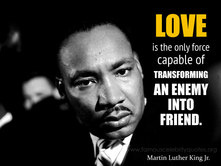 CHRISTIAN PRINCIPLES do not diminish in the face of ATROCITIES - extremely cruel acts, typically involving physical violence or injury- in fact, they intensify. The injustices and reprehensible behavior we have seen in the senseless executions of unarmed African-American men, AND in retaliation against innocent police have us all in shock, anger, disbelief and grief. However, holding the truths we believe, even at potential loss of life is what Christ followers around the world have exemplified for centuries. They believe steadfastly that Jesus is enough, and are armed with these truths:
"You have heard that it was said, 'Love your neighbor and hate your enemy.' But I tell you, love your enemies and pray for those who persecute you, that you may be children of your Father in heaven. He causes his sun to rise on the evil and the good, and sends rain on the righteous and the unrighteous. (Matt. 5:43-45) Jesus gives us a counter-cultural, no vengeance, yet winning strategy. "If you love those who love you, what credit is that to you? Even sinners love those who love them. And if you do good to those who are good to you, what credit is that to you? Even sinners do that. And if you lend to those from whom you expect repayment, what credit is that to you? Even sinners lend to sinners, expecting to be repaid in full. But love your enemies, do good to them, and lend to them without expecting to get anything back. Then your reward will be great, and you will be children of the Most High, because he is kind to the ungrateful and wicked. Be merciful, just as your Father is merciful. (Luke 6:32-36) I can hear the push back on this as I'm writing...but I didn't say it... I am an African-American woman with a husband, a son and two grandsons whose lives DEFINITELY matter to me! I also have friends whom I love in law enforcement, government and the military. I pray for their protection, and my emotions have swung the pendulum. Historically, I've marched and protested injustice more than the average person. I've also had more racial reconciliation discussions than most. When I devoted my life to Christ and was baptized, I began a NEW LIFE and immersed myself in Kingdom Culture. My first allegiance and priority (even over ethnicity, class or gender) is following Christ. (Gal. 3:28) In pressure-filled times like these, I might not like what the LORD directs me to do in His Word. Sometimes I rebel, or I'm hesitant to obey, but God's ways are ALWAYS right. Peacemakers who sow in peace reap a harvest of righteousness. (James 3:18)  Rigoberto is a guest contributing author on Driving Diversity and is currently serving as a Chi Alpha Missionary Associate at The University of Virginia. Hello, my name is Rigoberto and I’m diverse. Okay, glad we got that out of the way. I bet you’re dying to know if, as a Hispanic, I dream in English or Spanish. The answer is both. Anything else you’d like to know about my diversity before we continue? Years ago, as a teenager, an older Caucasian woman asked me a question about my dreams. I don’t fully recall the context of the conversation, but I do recall what direction the conversation went towards: the emphasis of my “otherworldliness” as a Hispanic. I have no doubt this kind woman meant no harm, and luckily, I was too young to take offense. Unfortunately, the trap of racial assumption, more eloquently termed by social psychologists as categorizing, is one that we as Christian leaders often fall prey to. I recently met a student at a university. He described himself as a mixture of different races, including Indian and Turkish. Due to the fact that his prominent physical features resembled that of someone from India, fellow Indian students criticized his lack of proficiency in the Hindi language and rejected him. Do you see where I’m going with this? Assumptions make donkeys out of you and me . . . Fortunately, no one is innocent of this! Categorizing is a normal process that helps us all make sense of our natural world, including interacting with diverse individuals. It’s only natural that we would identify individuals of a cultural group by our previous experience with that specific culture. Christena Cleveland, a social psychologist, professor, and author of the book Disunity in Christ, writes that when we categorize individuals we cease to view them as members of the body of Christ and perceive them as indistinct members of a cultural group instead. “By focusing on smaller, distinct categories for church groups, we erect and fixate on divisions that are far less important than the larger, diverse group of members of the body of Christ,” writes Cleveland. Operating with an awareness of our natural tendency to categorize and to make sweeping racial assumptions can help us honor one another better. We must intentionally rise above our habits to pursue more personal levels of understanding that show us we are one body with many parts. Here are three quick tips to help you avoid racial assumptions during first encounters: 1. Ask personal questions before you ask cultural questions. It’s important for people to know that you are genuinely interested in them as a person, not just a minority; African American, Latino, Filipino, etc. Ask them about their personal interests, what their dream job is, and where they grew up before you ask them about their cultural background. 2. Ask sensitive questions. Please don’t ask me if I grew up eating refried beans and tortillas as much as the orphans in Nacho Libre (the answer is yes, by the way). Ask significant questions -- questions that are thoughtful, and questions that foster depth. 3. Don’t focus strictly on questions about culture/race. Let’s make sure our conversation doesn’t single them out for their diversity. They have much to contribute apart from their cultural/racial experiences. I’d like to emphasize that I’m no pro at this -- even as a Hispanic I often get this wrong. I don’t always have the right answers. That’s why humility is always the key when interacting with our brothers and sisters from diverse backgrounds. In Humility, Andrew Murray writes that “humility towards men will be the only sufficient proof that our humility before God is real . . .” Be willing to listen, be willing to apologize when you unintentionally offend, and, please, be willing to persevere when it gets tough and potentially awkward (can I get an “Amen” somebody?). Love and humility will heal a multitude of sins. In an increasingly politically correct mission field like the university campus, we need to get a better grip of loving well, lest we discredit ourselves with the first question we ask. Now, tell me, where can I find the best taco truck in your town? Suggested Reading: Disunity in Christ by Christena Cleveland Humility by Andrew Murray The Bible by God 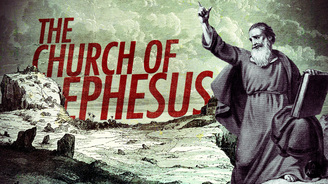 The letter to the church at Ephesus is special. It contains the clear, fluent plan of God. Paul tells the Ephesian pastors in Acts 20:27 that he gave them the whole will of God through three years of effort with tears, night and day. And he calls them to keep watch over the whole church with their complete knowledge of the Kingdom. What was so complete?
1. The Complete Church Ephesians 2. Through the grace and mercy of the cross and the power of the resurrection, both Jews and nations are made alive, included and united in one new man. (Eph. 2:1-18) 2. A Dwelling in which God Lives One united household of fellow citizens built on the foundation of the apostles and prophets, with Jesus as the chief cornerstone, built together to become a dwelling in which God lives by His Spirit. (Eph. 2:19-22) 3. God’s Manifold Wisdom Through His ethnically, socioeconomically diverse and united Church, God intends now to reveal His manifold wisdom to “the rulers and authorities in the heavenly realms.” (Eph. 3:10) ALL OF THIS WAS ACCOMPLISHED IN CHRIST JESUS OUR LORD, and has always been the plan. (Eph. 3:11) 4. All Things Under His Feet “[God has seated Him] far above all rule and authority, power and dominion...not only in this present age, but also in the one to come. And God placed all things under his (Christ’s) feet and appointed him to be head over everything for the church; which is his body, the fullness of him who fills everything in every way.” (Eph. 1:20-23) He’s given us the same incomparably great power as His holy people united together. The power is the same as what raised him from the dead and seated Him in heaven. (Eph. 1:19-20) And He is our Head! For clarity on this point, consider 1 Cor. 15:24-25, “Then the end will come, when he hands over the kingdom to God the Father after he has destroyed all dominion, authority and power. For he must reign until he has put all his enemies under his feet.” In other words, every enemy of Jesus is now being brought under His authority, in this age and for all eternity. Every evil, every injustice, every principality which oppresses people and opposes Him and His Kingdom ways. And the most powerful church, His very Body in the earth, is the Church united, Jews and nations as ONE NEW HUMANITY through Christ Jesus in which His fullness dwells by His Spirit! 5. A Kingdom, A Priesthood “And they sang a new song, saying: ‘You are worthy to take the scroll and to open its seals, because you were slain, and with your blood you purchased for God persons from every tribe and language and people and nation. You have made them to be a kingdom and priests to serve our God and they will reign on the earth.” (Rev. 5:9-10) So, in simple terms, here is the Whole Plan (Will) of God, made known to the pastors at Ephesus (Acts 20:27): A Church of every tribe, tongue and nation, healed and loving deeply across the deepest human divides, Jew and Gentile first, full of the Spirit of God and His power and authority under His headship, bringing every enemy of Christ under His rulership, His ways, in all the earth, until the day He hands over the Kingdom to the Father... “And when He has done this, then the Son himself will be made subject to him who put everything under him, so that God [the Father] may be all in all.” (1 Cor. 15:28) The key to all of this is one new humanity through Jesus Christ. Otherwise, there is not the complete body for Him to fill with His full presence to accomplish His whole plan.  Dale Stephens is a former missionary with Chi Alpha for 13 years (9 in Atlanta, GA) and currently serves as Pastor of Riverside Church in NW Atlanta. He and Andrea have three daughters, two goddaughters, and a dog. I was torn with emotions of awe and frustration as I watched Macklemore perform the closing song at the MTV Awards a few years ago. I was in awe as I watched him declare a passionate appeal of a prophetic type. He proclaimed in front of a large audience what he believes to be true, while also preaching a kind of vision of tomorrow for the world to believe in. For me, it was reminiscent of Martin Luther King Jr’s. “I Have A Dream” speech. I was torn with frustration as I empathetically knew he is proclaiming what millions resonated with, yet it was far from true peace and harmony. I couldn’t help but wonder who are the prophetic voices of the American church today for a Biblical vision of tomorrow. Was MLK an anomaly -- a once in a lifetime voice? Is God still prophetically proclaiming a gospel message for us all? Prophecy I was taught in my undergrad that prophecy operates in two possible definitions: 1. Forth-telling: proclamation of truth 2. Fore-telling: proclamation of future events For many of us, the term “prophecy” or “prophet” transports our minds to Old Testament passages. We unknowingly take a dispensational stance toward the terms. We mostly consider them for the ancient world. Prophets were those crazy types that seemingly ended with John the Baptist or Jesus. Prophets were the standouts who spoke against current culture. They were outsiders and rebels who had a streak of non-conformity. As a Pentecostal, there is a place for prophecy in our movement today. We acknowledge that God can use men and women to speak both fore-telling and forth-telling. In fact, in 1 Corinthians 12-14, Paul seems to gives a prioritization for prophecy. In the early days of the Pentecostal American experience, there was a strong emphasis on prophetic utterances. I have even seen a couple of prophets in my time. They too had a flare of “uniqueness”. The prophets and prophecy I have experienced have generally spoken to either individuals or churches. I wonder, why do we stop there? From Urgency to Emergency While in college, I worked at Bradley Memorial Hospital in the ER. In the ER, patients had to be identified as urgent or emergent. The label of “urgent” dictated the speed and effort by which a patient was received. “Emergent” received the highest level of effort, speediness, and care. As ministers, we have to see our world as emergent. Our communities and the individuals within, need life holistically today, tomorrow, and metaphysically. We live in a world of tension. We are progressing in our local society in many ways along racial needs. We see greater numbers of diversity all around us. Our country has progressed from recognizing individual human dignity to having key roles in government and society. Yet, entrenching along racial lines is happening. There are systemic and situational problems happening across our country. These are acts of injustice. As Christian Leaders, we have a responsibility to stand for justice. What will you do? Action The situation is emergent locally, nationally, and globally. We, as ministers, must proclaim prophetic truth. When I envision this kind of proclamation, I am envisioning modern day Moses, Isaiah, John, Jesus, and MLK. I picture men and women standing up for Biblically based truth, which will resonate and capture the world. I see pastors and missionaries leading the charge for the fullness of salvation rooted in eternal and earthly freedom. I am talking about being standouts not for the sake of self identifying with John the Baptist, but the kind of radical obedient Christ followers who recognize the time is now. Today, we must proclaim the fore-telling Truths of Scripture. We shall proclaim this Truth with a promise of a better life, community, and eternity for us all. Reconciliation is about Salvation...that all men, women, and children be found in shalom with God and His people. Prophetically Preach Preacher! Isaiah 19:19-25 In that day there will be an altar to the Lord in the heart of Egypt, and a monument to the Lord at its border. It will be a sign and witness to the Lord Almighty in the land of Egypt. When they cry out to the Lord because of their oppressors, he will send them a savior and defender, and he will rescue them. So the Lord will make himself known to the Egyptians, and in that day they will acknowledge the Lord. They will worship with sacrifices and grain offerings; they will make vows to the Lord and keep them. The Lord will strike Egypt with a plague; he will strike them and heal them. They will turn to the Lord, and he will respond to their pleas and heal them. In that day there will be a highway from Egypt to Assyria. The Assyrians will go to Egypt and the Egyptians to Assyria. The Egyptians and Assyrians will worship together. In that day Israel will be the third, along with Egypt and Assyria, a blessing on the earth. The Lord Almighty will bless them, saying, “Blessed be Egypt my people, Assyria my handiwork, and Israel my inheritance.” Follow Dale @atldrev or contact him via email at dale@riversideatlanta.church. 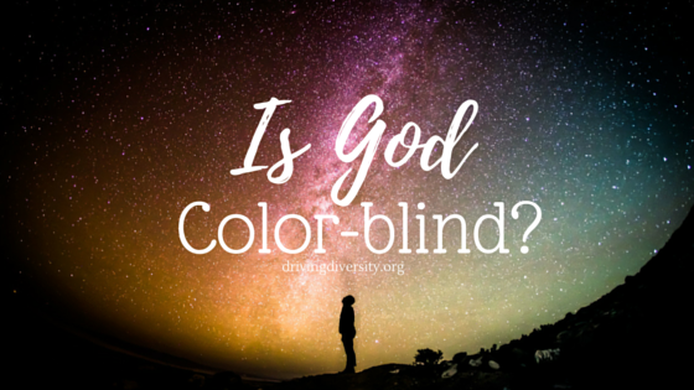 As I interact with different people regarding diversity issues, I often come across those who tell me they are color-blind. Now, this does not mean they cannot distinguish between green and red. I think what they are trying to say is that they see everyone the same; they don’t “see color.” This, I perceive, is a response to our history as a nation of dividing people into color groups and granting them privileges accordingly. Today we recognize that such a system is evil. So the righteous response must be the direct opposite reaction -- to develop the ability to see everyone the same. But is this what Christians should do? Is being color-blind a Godly character trait? In other words, is God color-blind? Well obviously, God is not color-blind. He sees EVERYTHING! We know that he created color, in all its endless shades and hues. He did this, we feel, because he is a creative God who delights in variety and beauty. He is artistic, reveling in splendor and majesty. It is not too much to infer that when he created humanity, he endowed it with all the variety and diversity that he gave the rest of creation. He did not desire a uniform representation of his being. Creation reveals God’s character (Romans 1), humanity his very being- “So he created human beings in his own image, in the image of God he created them: male and female he created them” (Gen 1:27). It is not a great leap to reason that God, who is a wonderfully diverse being, would imprint his image on a diverse humanity. One of the things I love about having a Christian family is the realization that it takes both my husband and I to even begin to represent God to our children. In the same way, it takes all the different ethnic and racial groups of our world, all the cultures, in order for us to see God in his fullness. We live in a time when our society is trying to erase the uniqueness of gender. For the most part, the Christian church fights against this attack, seeing it for what it is, an attempt to repudiate the truth that we are created in God’s image. So why would we, in like manner, join attempts to erase the uniqueness of our ethnic creation. In Revelation 7:9 John tells us, “And then I looked and saw a multitude that no man could count from every nation, tribe, people and language.” This verse makes it clear that at the end of the age, even after our physical transformation we will retain the uniqueness of our ethnicity. This means that God values who we are in this world if he will retain our external ethnic identity markers for all eternity. In like manner, we also should celebrate our ethnic distinctiveness and uniqueness. We should realize that just as it takes a mother and father to represent God the Father to children, it takes the whole body of Christ to represent God to the world. Often you will hear sermons regarding this. These are usually focused on the need to have the varieties of gifts present in a local congregation. I believe wholeheartedly that the body is diminished by any form of uniformity, whether in abilities, ethnicity, or even economically. It takes all of who we are to represent all of who God is. So, the answer to my original question is no. God is not color-blind nor does he discriminate. He makes his love and grace available to all. “He rains down on the just and the unjust.” Still, he does not see us the same, nor does he treats us the same. Just ask ten people how they came to know Christ; you will hear ten very different stories. Like a good Father, he knows we each have different needs and meets those needs in unique ways. To leave behind our country’s legacy of valuing its citizens according to their skin color and ethnicity, we need not deny that color. On the contrary, we must first embrace the reality of our history and the effects we live with today. Instead of seeing everyone the same and treating everyone the same, we should strive to see everyone as they are and treat them with the love and compassion they uniquely need. Ultimately, this will result in specific acts for each individual. Not color-blind, color conscious, nor controlled, but color aware and love controlled. |
Categories
All
Contributing Authors
|

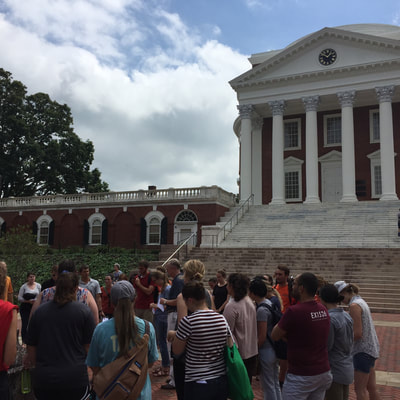
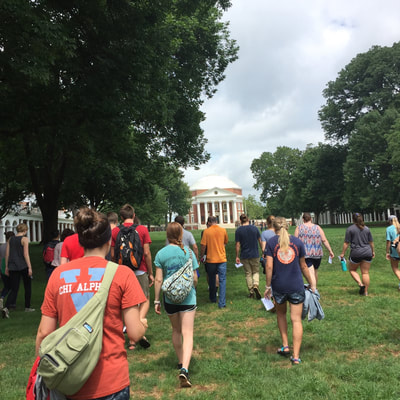
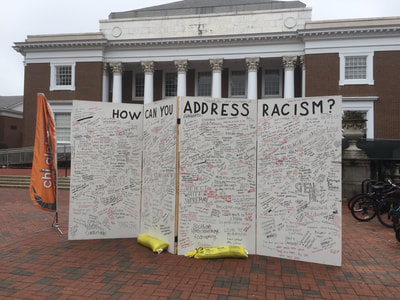
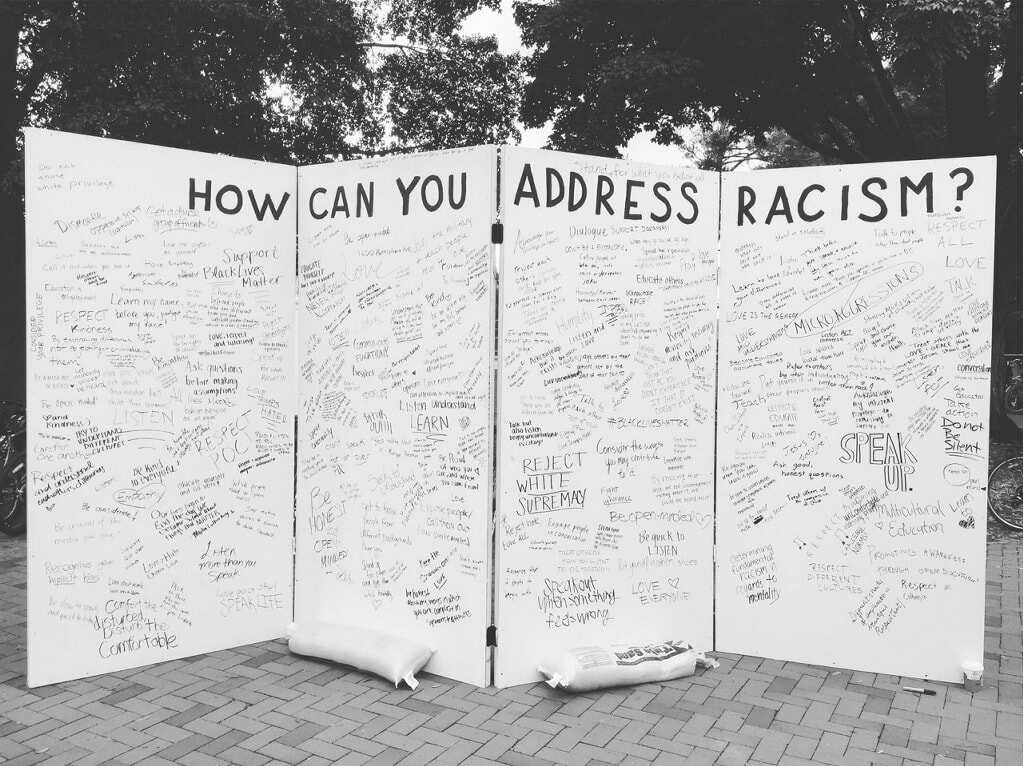
 RSS Feed
RSS Feed